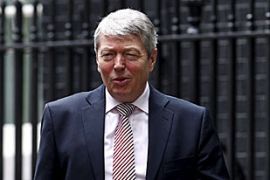UK ‘terrorism suspects’ win appeal
Court rules against government over secret evidence used to justify house arrests.

‘Severe restrictions’
Speaking to Al Jazeera, James Welch, legal director of Liberty, a British legal charity, said: “The system of control orders makes people suspected of terrorism subject to very severe sanctions.
“They [the sanctions] are the sort of penalties you can get for many types of criminal offence, without them [the suspects] being given the privilege of a proper criminal trial before a criminal court.
“This is a means of getting around the criminal law, making people subject to very severe restrictions on their liberty without giving them the benefit of a trial.
“They [the suspects] have restrictions which can include an 18-hour curfew each day, restrictions on who they can visit, restrictions on where they can go, very, very severe restrictions on their liberty.”
Presumed guilt
Eric Metcalfe of Justice, a British legal and human rights organisation, said: “One thing is clear from this judgment, it’s going to be much more difficult for the government to sustain the use of control orders when they have to disclose the evidence to the suspects.
“Parliament and government have to decide whether they are going to limp on with using secret evidence in control orders or whether they can actually take the bold step of getting rid of it once and for all.”
The orders have been used to restrict the movements of individuals the authorities suspect of involvement in “terrorism”, but against whom they lack sufficient evidence to mount a trial.
Human rights and justice organisations say they violate fundamental rights and freedoms, running the risk of turning Britain into a police state, with suspects placed under tight surveillance without knowing what they have done wrong.
Because the orders rely on secret information collected by the security services that cannot be made public, they also presume guilt without evidence being presented and without it being able to be challenged in court.
‘Protecting public’
It is the second time the House of Lords has ruled against elements of control orders, 17 of which are now in force in Britain.
Alan Johnson, Britain’s interior minister, said: “All control orders will remain in force for the time being and we will continue to seek to uphold them in the courts.
“Protecting the public is my top priority and this judgment makes that task harder.
“We introduced control orders to limit the risk posed by suspected terrorists whom we can neither prosecute nor deport.”
Since their introduction, a total of 38 people have been subjected to them, seven of whom absconded while under watch.
Rights campaigners said the judges’ decision could mark a turning point in the use of secret evidence in control orders.